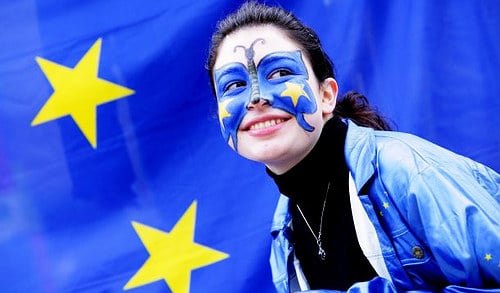"The union and its forerunners have for over six decades contributed to the advancement of peace and reconciliation, democracy and human rights in Europe," Nobel Committee president Thorbjørn Jagland said in Oslo.
In a first reaction from one of the three main EU institutions, European Parliament head German Socialist Martin Schulz said on Twitter he was "deeply touched, honoured that the EU has won the Nobel Peace Prize. Reconciliation is what the EU is about. It can serve as an inspiration."
European Commission president Jose Manuel Barroso said it was a "great honour" for the entire 27-member bloc.
The prize for the EU, however, is a shocker at a time when European solidarity is facing its most daunting challenge in decades amid deep rifts between a south drowning in debt and a wealthier north, led by Germany, only reluctantly coming to the rescue.
Whether or not that begrudging assistance will keep the European project afloat remains to be seen, but the deep crisis has broadened the gulf already felt between citizens in the different member states and a Brussels long seen as too distant and bureaucratic.
"The EU is currently undergoing grave economic difficulties and considerable social unrest," Jagland acknowledged Friday.
"The Norwegian Nobel Committee wishes to focus on what it sees as the EU's most important result: the successful struggle for peace and reconciliation and for democracy and human rights. The stabilising part played by the EU has helped to transform most of Europe from a continent of war to a continent of peace," he said.
The creation of the organization is credited with helping to bring peace and stability to the war-torn continent by bringing together arch-enemies France and Germany and herding them down the same path.
Despite recurring difficulties, the EU has become the biggest common market in the world, allowing free circulation of goods, people, services and capital.
Over the years, the pioneering project has swelled to encompass 27 countries which not long ago sat on either side of the "iron curtain".
They came to the table with vastly different economic, social and cultural situations, but following intense integration efforts, a full 17 of them now share a common currency.
This year's prize will also cause shockwaves in host country Norway, which itself has rejected joining the union twice, in 1972 and 1994, and where three quarters of the inhabitants today say they are opposed to membership, according to recent polls.
Committee president Thorbjoern Jagland, who is also the secretary general of the Council of Europe, is known to be a fervent supporter of the EU.
He told reporters Friday he did not expect the prize pick to be controversial in Norway.
"It is possible to be opposed to Norwegian EU membership and at the same time acknowledge the peace-creating role EU has had in Europe," he said.
Despite the bloc's deepening difficulties, its tumultuous history shows that, until now at least, the EU has always managed to survive crises, often strengthening its integration in the process.
The nod to the EU this year can be seen as an effort by the Nobel Committee to rectify a historic oversight: most experts agree that after Gandhi, who died without receiving the honour, the European project is the most noticeable hole in the Nobel family tree.
It remains unclear who will collect the prize for the EU.
"They have to decide what leader will come and pick up the gold medal," Jagland said.
In addition to a gold medal, the award to be handed out at a ceremony in Oslo on December 10th will consist of a Nobel diploma and 8.0 million Swedish kronor ($1.2 million).



 Please whitelist us to continue reading.
Please whitelist us to continue reading.
Member comments